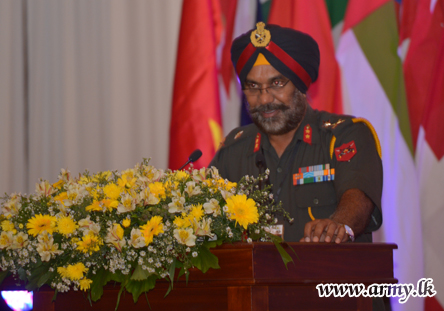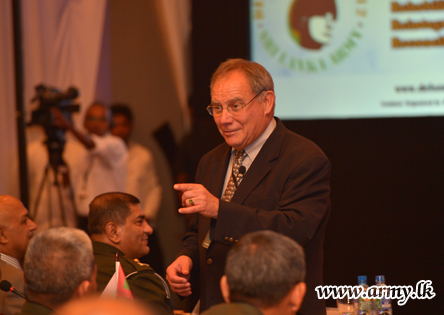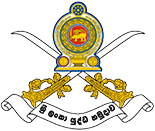The fact that the very central theme of ongoing sessions of the ‘Defence Seminar - 2012’, titled ‘Towards Lasting Peace and Stability’, is designed with a view to sharing Army’s post-war experiences of unparalleled proportions, turned out to be a timely arrangement as several foreign contributors to the inaugural sessions complimented Sri Lanka and the military for their “impressive and remarkable achievements” in the post-war recovery and reconstruction sphere within a short span of three years.
Sessions of the ‘Defence Seminar - 2012’ on Reconstruction, Resettlement, Rehabilitation, Reintegration, Reconciliation (5Rs), slated to open, share and discuss a wide range of strategic and conceptual innovations and infrastructure issues, directly related to Sri Lanka’s post-conflict achievements and development, are now in progress at Colombo Galadari Hotel. The sessions will continue till Friday (10).
Indian Major General G.S Shergill expressing his views on ‘Indian Assistance in Reconstruction and Resettlement in Sri Lanka’ sub-theme during the second half of Wednesday’s sessions underlined the fact that any post-conflict development should be independently mapped out by respective governments in power and no other nation could impose any conditions on that right.
It is the people of that country know what their basic requirements are soon after a conflict and Sri Lanka is no exception. What we can do is only recommending as an assisting country to such a programme and no one should be able to interpret what the people want as theirs. Including India, all other actors are peripheral and we are in Sri Lanka to contemplate what her people need, not to impose what we would prefer, Major General Shergill added.
In all over the world, we see three major problems arising all the time. Terrorism, Extremism and Religious Fundamentalism are plaguing the world and containing these dangerous trends remains everyone’s responsibility. In the Sri Lankan context, as the violence was on the rise, India became concerned with the swelling numbers of displaced people and their grievances that needed to be addressed without further delay. Three years have gone by.
“Sri Lanka has done tremendously well in addressing many of those issues and bringing normalcy to affected areas. We see a much improvement in the sphere of reconstruction and recovery, of course with the able support of the Army,” he commented.
Major General Shergill did not mince his words to highlight the close and strong bonds of bilateral goodwill between Sri Lanka and India since the former being one of the closest neighbours, just 21 miles away from the Southern tip of India. Being both of them (Sri Lanka and India) ‘blood brothers’ as the Father of India, Mahathma Gandhi once quipped; both of us should be able to ‘adjust our differences’ in an amicable manner. Gandhiji foresaw future relations in that manner, about 70 years ago, Major General Shergill added.
Meanwhile, Dr Russell Howard, a retired Brigadier General of the US Army making his presentation to the seminar drew parallels between post-conflict scenario between Sri Lanka and Somalia and congratulated Sri Lanka Army’s gains in the post-war recovery.
“Sri Lanka has performed remarkably well in the fields of recovery and de-mining. A nation’s military can have a profound source of unification spirit for a country battered by a civil war and Sri Lanka’s military assistance has gone a long way, particularly in the field of de-mining and reconstruction”, Dr Russell added.
The retired US military officer speaking on ‘Civil-Military Cooperation’ pointed out that Somalia, for which he served some time back, has regrettably failed in disarmament, demobilization and reconstruction unlike the case in Sri Lanka. Eliciting examples from US-based yesteryear Civil Conservation Corps (CCC), he highlighted the importance of having a dynamic structure, composed of military men to carry out community-oriented roles as the US did in late 1930s.
Criticisms against Sri Lanka have to be weighed against what they learnt from the past and key areas of major concern to the public need to be addressed, empowering particularly the women’s sector. He also noted that as per statistics, there appears a shift of approach on the part of the Diaspora since their investment proportions in the Jaffna Peninsula has increased considerably in the latter part of 2011. “There is good news from many quarters to Sri Lanka’s growth and recovery. You know how disasters like the Tsunamis were managed and the military’s intervention relieved the impact of that tragedy,” Dr Russell said.
Sessions of the ‘Defence Seminar - 2012’ on Reconstruction, Resettlement, Rehabilitation, Reintegration, Reconciliation (5Rs), slated to open, share and discuss a wide range of strategic and conceptual innovations and infrastructure issues, directly related to Sri Lanka’s post-conflict achievements and development, are now in progress at Colombo Galadari Hotel. The sessions will continue till Friday (10).
Indian Major General G.S Shergill expressing his views on ‘Indian Assistance in Reconstruction and Resettlement in Sri Lanka’ sub-theme during the second half of Wednesday’s sessions underlined the fact that any post-conflict development should be independently mapped out by respective governments in power and no other nation could impose any conditions on that right.
It is the people of that country know what their basic requirements are soon after a conflict and Sri Lanka is no exception. What we can do is only recommending as an assisting country to such a programme and no one should be able to interpret what the people want as theirs. Including India, all other actors are peripheral and we are in Sri Lanka to contemplate what her people need, not to impose what we would prefer, Major General Shergill added.
In all over the world, we see three major problems arising all the time. Terrorism, Extremism and Religious Fundamentalism are plaguing the world and containing these dangerous trends remains everyone’s responsibility. In the Sri Lankan context, as the violence was on the rise, India became concerned with the swelling numbers of displaced people and their grievances that needed to be addressed without further delay. Three years have gone by.
“Sri Lanka has done tremendously well in addressing many of those issues and bringing normalcy to affected areas. We see a much improvement in the sphere of reconstruction and recovery, of course with the able support of the Army,” he commented.
Major General Shergill did not mince his words to highlight the close and strong bonds of bilateral goodwill between Sri Lanka and India since the former being one of the closest neighbours, just 21 miles away from the Southern tip of India. Being both of them (Sri Lanka and India) ‘blood brothers’ as the Father of India, Mahathma Gandhi once quipped; both of us should be able to ‘adjust our differences’ in an amicable manner. Gandhiji foresaw future relations in that manner, about 70 years ago, Major General Shergill added.
Meanwhile, Dr Russell Howard, a retired Brigadier General of the US Army making his presentation to the seminar drew parallels between post-conflict scenario between Sri Lanka and Somalia and congratulated Sri Lanka Army’s gains in the post-war recovery.
“Sri Lanka has performed remarkably well in the fields of recovery and de-mining. A nation’s military can have a profound source of unification spirit for a country battered by a civil war and Sri Lanka’s military assistance has gone a long way, particularly in the field of de-mining and reconstruction”, Dr Russell added.
The retired US military officer speaking on ‘Civil-Military Cooperation’ pointed out that Somalia, for which he served some time back, has regrettably failed in disarmament, demobilization and reconstruction unlike the case in Sri Lanka. Eliciting examples from US-based yesteryear Civil Conservation Corps (CCC), he highlighted the importance of having a dynamic structure, composed of military men to carry out community-oriented roles as the US did in late 1930s.
Criticisms against Sri Lanka have to be weighed against what they learnt from the past and key areas of major concern to the public need to be addressed, empowering particularly the women’s sector. He also noted that as per statistics, there appears a shift of approach on the part of the Diaspora since their investment proportions in the Jaffna Peninsula has increased considerably in the latter part of 2011. “There is good news from many quarters to Sri Lanka’s growth and recovery. You know how disasters like the Tsunamis were managed and the military’s intervention relieved the impact of that tragedy,” Dr Russell said.
 |
 |

